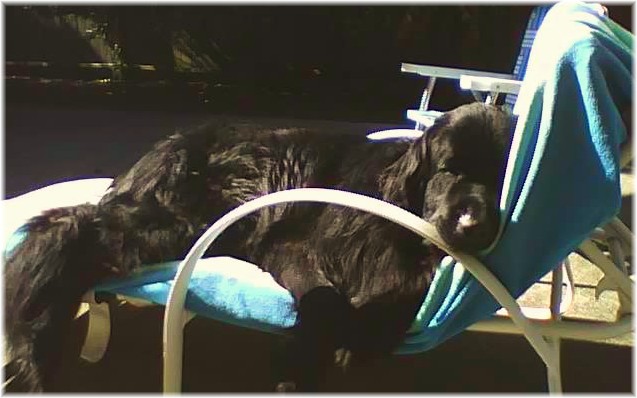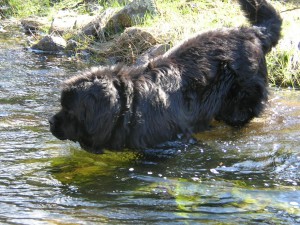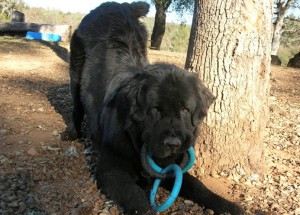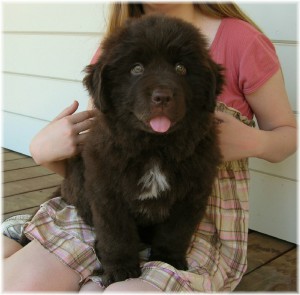Their Nature
The Newfoundland is a large working-type dog. Grown males average 130 lbs. Females weigh between 100 and 110 lbs. They initially grow at a rate of 10 lbs. per month. The Newfoundland is drawn to water and is equipped with a heavy double coat which insulates against the cold and the wet.
They are a powerful swimmer and possess true life-saving instincts. If you look at their paws, you’ll see the webbed toes that augment their swimming stroke. They are a highly social creature with a gentle and trainable nature.The Newfoundland will maintain their youthful playfulness up to about age three. As an adult in a comfortable, loving home, they will be a calm, easy-going and wonderful companion dog. The level of activity will then be determined by the lifestyle of their family. You will see early on that they clearly value or seek human companionship.
Their History
Because of their strength and tractable nature, they have served in the fishing industry hauling heavy nets, wood from forests, and powering blacksmith bellows. Their origins are debated but it is generally thought that this type of dog was first identified in Newfoundland. In the 1800’s the breed was refined in England and the U.S.
Famous Newfoundlands are “Seaman” of the Lewis & Clark expedition and the original “Nana” of the Peter Pan story. An excellent picture book for young children is “Seaman’s Journal, On the Trail With Lewis and Clark” by Patricia Reeder Eubank.
Their Needs
As with all the giant breeds, we take extra care with the joints of Newfoundlands. Breed wide, hip dysplasia alone, runs about 20%. But, there is MUCH you can do to beat those odds. Your Newfoundland will love and benefit from moderate daily exercise. It is recommended that you walk your Newfoundland 5 minutes per day per month of their lives for the first year. For example if the puppy is 2 months old, you would walk them for 10 minutes per day. A small fenced yard with plenty of shade is adequate as long as they get some exercise in the form of playtime or walks every day. The Newf needs time to roam freely every day. Exposure to daily sunshine facilitates the development of strong bones. Never leave them in a car that is parked in the sun unattended.
Newfoundlands need high quality nutrition which is suitable for their species. We recommend Taste of the Wild, available from Amazon.com. We also suggest that you feed your puppy three times a day until they are at least 12 weeks old, up to 6 months old. Even after your Newfoundland is fully grown, it is recommended that you feed twice a day to avoid a condition called BLOAT, which comes from eating too much too quickly. Too rapid growth predisposes the Newfoundland to orthopedic problems, so don’t let them get plump as a pup or adult. Some people love to see their Newfs tip the scales, but a trim Newfoundland feels better and lives longer. Rapid weight gain and being overweight are both serious threats to a Newfoundland’s health.
The Newf has a huge requirement for fresh, clean water. They are big, messy drinkers. We have found second-hand crock pot dishes which are in good condition to be great water bowls for grown Newfs.
They will shed heavily as summer approaches with a lighter shedding year round. So, grooming must be part of the routine. Comb them out once a week at a minimum. However, toward summer you will need to groom them more often. A quick daily grooming keeps things manageable. A pet brush is fine at first for your puppy but you’ll soon need a long-toothed comb to get all the way down to the skin. A tool called a “rake” is great for removing the under coat. One name brand tool that has great reviews is “The Furminator”. Grooming keeps her clean and comfortable. This will take a little training as little ones might rather chew on the brush, but she’ll soon come to enjoy this special attention from you. You can start with a 10 second grooming tolerance session per day and after a few days move up to 15 seconds etc. Your Newfoundland must be trained to allow grooming.
In order to continue your Newf’s immunity to diseases, consult your veterinarian for a maintenance routine of vaccinations and boosters. Your vet can also help you with flea/tick control and worming. These are essential health care measures.
Newfoundlands are obedient dogs, WHEN TRAINED. If not trained they can become 130 lbs. of canine exuberance paw-printing your new white shirt or dragging you down the sidewalk like a pull toy. For your dog’s safety and your own sanity, we highly recommend that you enroll in obedience training. Then practice a little every day. And stay with the training because Newfoundlands have a long puppy-hood. The results will bring out the excellent qualities of their reputation.
Especially for Newfie Puppies
Holding a baby Newfoundland is like filling your arms with a round, fluffy bear cub. Though they are probably the cutest puppies in the WHOLE WIDE WORLD they require a lot of time and commitment from their people.
Baby Newfies go through an oral/teething phase and need lots of interesting, safe chew toys. They also need to learn a “no mouth” or “no bite” command right away. It’s surprising how needle-sharp the baby teeth are.
Begin training your puppy immediately in order to avoid developing bad habits that are hard to break. This is extremely important for any large breed puppy. Don’t be tempted to let the adorable eight week old puppy do anything you would not like a 130 pounder to do. Find a good puppy training class to attend. You may not want to teach them to be a lap dog. It is great when they are a puppy, but 130 lbs in your lap or a friend of yours may not go over well.
Shelter them from exposure in parks and places that unknown dogs frequent until the vaccination series is complete.
The young Newfoundland has a rapid growth pattern. The joints and bones are soft and vulnerable to injury. Jumping, rough-housing or having his limbs pulled could cause permanent damage so care must be taken. Fetching Frisbees and sticks and stair-climbing are dangerous activities for pups. Play time with a larger or very active dog such as a Golden Retriever or Aussie Shepherd is also unsafe for growing puppies. Though free running is good for them , they should not be encouraged to jump. Nor should he spend a lot of time on slick floors. they should be assisted when getting out of the car or coming off of a bed. Playing in the snow should be monitored as this could be a set up for injuries. These precautions should be in place until the elbows and shoulders are more completely developed—around 14 months. We recommend a later rather than earlier spay/neuter age of around 14 months old. The growth hormones produced while the pup is maturing sexually, offer some protection against orthopedic problems common in the breed.
A Word About “Dry Mouths”
“Dry mouth” is the common term used to describe Newfoundlands that have been selectively bred to have shorter snouts. Having shorter snouts means that the pooches tend to not drool as much as a typical newf. A more accurate term for them would probably be “drool-less”, since, well… they drool LESS than other Newfoundlands. If it’s a hot day, or they just took a big drink of water, they’re going to have some slobber going on. But they’re definitely less likely to have the constant shoestrings hanging out the sides of their mouths!
Lastly
A Newfoundland needs to be looked over, touched, talked to, and played with every day for his entire life. First of all, this is a great way to catch any problems that might be developing in eyes, skin, ears etc. Secondly, the more time the owner spends with her the better companion they will be. Then take lots of pictures and watch her grow. Send us pictures as we would love to see how your puppy is doing and how they look. Feel free to include yourself in the pictures!
At Wolf Creek Newfoundlands we want to partner with you in the care of your Newf. We ask that our adopting families always feel free to contact us with any questions or concerns you have throughout the life of your Newfoundland.

An example from the Working Group…
A Wolf Creek pup lounges pool side in his happy home.



